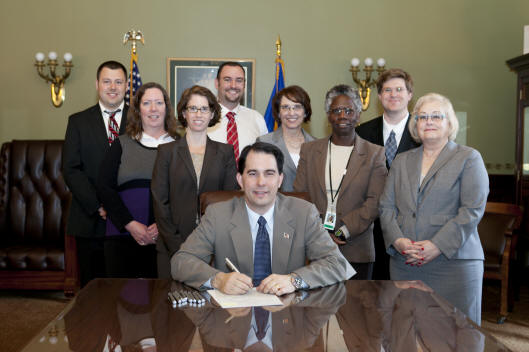Knodl Welfare Reform Bill Becomes Law
MADISON – Taxpayers will no
longer be on the hook when people defraud the state’s W-2 program. Senate
Bill 426 authored by Representative Dan Knodl (R-Germantown), State Senator
Alberta Darling (R-River Hills), and Representative Scott Krug (R-Wisconsin
Rapids) cracks down on fraud, penalizing first offenders. Representative
Knodl says the legislation brings the W-2 program back to the principles
that made it effective.
“The underlying premise of W-2—that honest individuals willing to work
should be given a helping hand—was forgotten as fraud infected the system
and criminals stole from taxpayers and the truly needy,” Knodl said. “For
example, under the Doyle administration, Wisconsin law allowed an applicant
for assistance to lie twice before they could be subject to sanction. As
Governor Walker’s Taskforce on Waste, Fraud, and Abuse recently discovered,
this type of program administration made a mockery of program integrity and
cost taxpayers roughly $200 million annually. I believe Wisconsin deserves
better.”
A glitch in state law prohibited the state from pursing intentional program
violations until an individual had committed at least three violations. The
lax law resulted in few prosecutions, creating an extreme incentive to
cheat. Senate Bill 426 cuts off W2 payments for six months after the first
intentional offense. A person could lose their benefits for a year on their
second offense and permanently on the third.
Senate Bill 426 was passed by a bipartisan majority in the Assembly and
Senate, and was
signed into law by Governor Walker on April 2, 2012.

I would like to thank Governor Walker, Department of Children and Families
Secretary Eloise Anderson, her staff, and my staff, for making this bill
possible.
DNR Needs your Input
Governor Walker’s Executive Order #61
Relating to Job Creation and Small Business Expansion, issued on February
22, 2012 asks all state agencies to conduct a thorough review of its
regulations and to recommend for possible elimination outdated and overly
cumbersome regulations that provide no or little demonstrable benefit.
In response to this request, the DNR has created a website for businesses
and the general public to submit their suggestions for consideration. The
website is:
http://dnr.wi.gov/business/RulesReview.html
This is an important task where everyone's
input is necessary for success. The DNR welcomes the public’s input. The DNR
asks trade organizations to help spread the word by including an article
about this effort in their publications and email alerts.f
|

